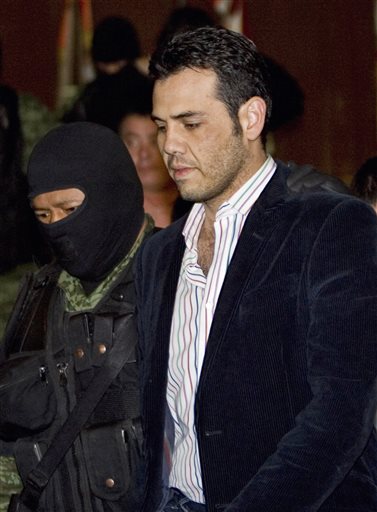CHICAGO - A high-ranking member of Mexico's Sinaloa cartel and son of one of the drug ring's leaders pleaded guilty to drug trafficking a year ago and has been cooperating with authorities, federal prosecutors in Chicago announced Thursday.
Jesus Vicente Zambada Niebla, who described himself as a "trusted lieutenant" of his father, pleaded guilty in April 2013 to one count of conspiracy to possess with intent to distribute multiple kilograms of cocaine and heroin between 2005 and 2008, according to a plea agreement unsealed Thursday.
Zambada, 39, was indicted in Chicago and arrested in Mexico City in 2009, and extradited in 2010.
Also named in the indictment are cartel leader Joaquin "El Chapo" Guzman, who was captured in February, and Zambada's father, Ismael "El Mayo" Zambada-Garcia. He is considered to be a close ally of Guzman's in running the cartel and is not in custody.
There is no indication that information Jesus Zambada provided helped lead to Guzman's capture at a hotel in Mexico. Randall Samborn, a spokesman for the U.S. Attorney's Office, declined to comment on the timing of the plea agreement being unsealed.
Court records show federal prosecutors asked U.S. District Judge Ruben Castillo in January to unseal the document, saying only "the overriding interests" for sealing it had "passed or have been remedied." The motion states Zambada objected to the agreement being unsealed.
According to the plea agreement, Zambada told authorities he acted as a surrogate and logistical coordinator for his father, sending and receiving messages about cartel operations and at times coordinating deliveries of narcotics from Central and South America to Mexico and into the United States, including Chicago.
The document also states Zambada was responsible for distributing multiple tons of cocaine, sometimes moving hundreds of kilograms on a weekly basis, between 2005 and 2008.
Federal authorities have said Guzman made Chicago a primary distribution hub, relying on the city's extensive train, airport and highway systems to transport narcotics. The plea agreement describes a multinational operation in which the cartel used "stash houses," or offices, in multiple cities to store drugs, cash and weapons and used violence or threatened violence against law enforcement and rival cartels.
One of Zambada's attorneys, Fernando X. Gaxiola, said neither he nor the other attorneys would comment.
Michael Vigil, the DEA's former head of international operations, said Zambada could offer valuable information about the highest rungs of the Sinaloa cartel because he "played a key role."
"He wasn't part of the muscle who went out and got rid of individuals. He was more in terms of the brain trust of the organization," Vigil said, adding that Zambada's father was grooming his son for a leadership role.
And Phil Turner, a former federal prosecutor who prosecuted several drug cases, said Thursday's announcement could be "extremely significant," believing there's no reason Zambada could not testify against Guzman if he had firsthand knowledge of the leader's activities.
Zambada faces a maximum sentence of life in prison and a maximum fine of $4 million, said Zachary T. Fardon, U.S. Attorney for the Northern District of Illinois. But Fardon said prosecutors could request a shorter prison term if they determine Zambada has sufficiently cooperated.
"This guilty plea is a testament to the tireless determination of the leadership and special agents of DEA's Chicago office to hold accountable those individuals at the highest levels of the drug trafficking cartels who are responsible for flooding Chicago with cocaine and heroin and reaping the profits," Fardon said.
Zambada also agreed to forfeit more than $1.37 billion. A sentencing date has not been set.
Zambada typified a new, yuppie-style generation of drug suspects when he was arrested in an upscale Mexico City neighborhood in 2009, and authorities paraded him before TV cameras in a stylish black blazer and dark blue jeans. His suave image was a sharp contrast to a photo of him with moustache and cowboy hat released by the U.S. Treasury Department in 2007.
He also broke the mold when his attorneys argued in 2011 that he and other Sinaloa cartel leaders were granted immunity by U.S. agents -- and carte blanche to smuggle cocaine over the border -- in exchange for intelligence about rival cartels engaged in bloody turf wars. Prosecutors denied the claim, saying DEA agents met with Zambada but never entered into such an agreement.
In the plea deal unsealed Thursday, Zambada admitted he paid bribes to Mexican law enforcement on multiple occasions, sometimes at the direction of his father, to further the cartel's business.
Mexico's Foreign Ministry and the country's Interior Department, its lead law enforcement agency, did not immediately respond to requests for comment. The Mexican attorney general's office declined comment, saying it was a U.S. case.
The announcement comes just days after another key figure in the cartel pleaded guilty to plotting to deliver heroin to Chicago. Tomas Arevalo-Renteria faces a prison sentence ranging from 10 years to life.
Samborn declined to say where Zambada is being held, other than to say he is in federal custody.

